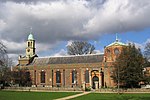West Hall, Kew
1600s establishments in EnglandGrade II listed buildings in the London Borough of Richmond upon ThamesGrade II listed houses in LondonHistory of the London Borough of Richmond upon ThamesHouses in the London Borough of Richmond upon Thames ... and 2 more
Kew, LondonUse British English from July 2016

West Hall at West Hall Road, Kew, in the London Borough of Richmond upon Thames, is a Grade II listed building dating from the end of the 17th century. It is Kew's only surviving 17th-century building apart from Kew Palace.
Excerpt from the Wikipedia article West Hall, Kew (License: CC BY-SA 3.0, Authors, Images).West Hall, Kew
West Hall Road, London North Sheen (London Borough of Richmond upon Thames)
Geographical coordinates (GPS) Address Nearby Places Show on map
Geographical coordinates (GPS)
| Latitude | Longitude |
|---|---|
| N 51.4758 ° | E -0.2789 ° |
Address
West Hall Road 4
TW9 4EE London, North Sheen (London Borough of Richmond upon Thames)
England, United Kingdom
Open on Google Maps









